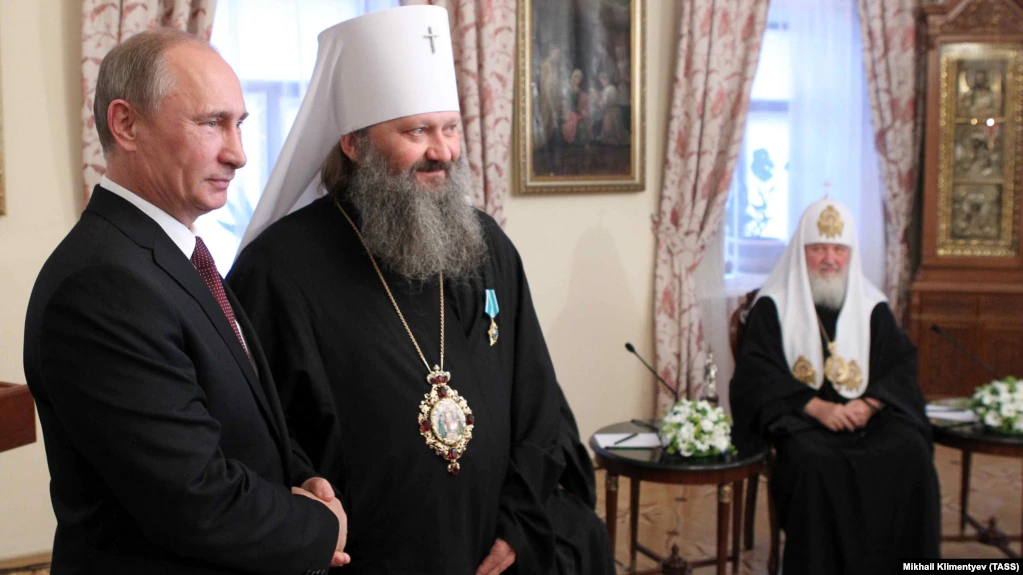A national poll shows that 74% of respondents believe that the Ukrainian Orthodox Church of Moscow Patriarchate, still very influential in Ukraine, should sever its ties with Russia, and 51% of Ukrainians believe that the government should ban it entirely. As well, it indicates that amid the Russian invasion, almost all Ukrainian citizens identify themselves as Ukrainians (98%) and don’t see Russians and Ukrainians as “one people” (91%). Additionally, 75% of Ukrainians identify themselves as Europeans.
One of the Ukrainian reputable pollsters, the Sociological Group Rating, has published the results of its eighth national poll titled “Ukraine during the war” carried out on 6 April. Here are the major findings of the Rating Group’s poll.
- The survey showed a significant increase in pride regarding Ukraine among the respondents. While in August 2021, 34% of the respondents said they felt proud of their country (at that time, the emotion that prevailed was sadness regarding Ukraine), today this feeling is dominant (80%). 32% feel sadness regarding Ukraine, 20% feel joy, 16%, fear, 11%, anger, and 6%, interest. Today, such emotions as indifference and shame regarding Ukraine are practically absent among the respondents.

- The emotion of pride regarding Ukraine is dominant among all the respondents, regardless of their age or region of residence. Residents of the Center of the country feel a little more joy (the time of this survey coincided with the liberation of three central regions from the occupiers). In addition, joy is a more common emotion regarding Ukraine among the youth. At the same time, fear for Ukraine is most often registered among the residents of the East of Ukraine today.
71% of Russians feel “pride, joy, respect, hope” regarding war against Ukraine – poll
- Since August 2021, the share of the respondents who identify as the citizens of Ukraine has increased significantly (from 75% to 98%), as did the share of those who identify as “Europeans”: from 27% to 57%. Instead, fewer respondents tend to describe themselves as “the Soviet people”: their share has decreased from 21% to 7%. Also, an absolutely high level of local patriotism has been recorded.
Support for Ukraine’s EU accession hits historic high of 91% amid Russian invasion – poll
- The identification as the citizens of Ukraine dominates among all the age and regional groups today. Regarding European identification, there are practically no differences among the age groups. At the same time, there are some differences from the point of view of macro-regions: European identification is somewhat more prevalent in the West and in the Center. The Soviet identity is relatively more common among the most elderly respondents.

![]()
![]()
![]()
![]()
![]()
![]()
![]()
![]()
![]()
- The vast majority (91%) of the respondents do not support the statement that “Russians and Ukrainians are one people” (one of the major points of Russian propaganda, – Ed.). Today, only 8% have such an opinion (the share of such respondents was 41% in August 2021 and 21% in March 2022). This idea is still supported by 23% of the residents of the East of Ukraine and by 13% of the older respondents. In contrast, in other macro-regions and age groups, the support for this statement is almost non-existent.
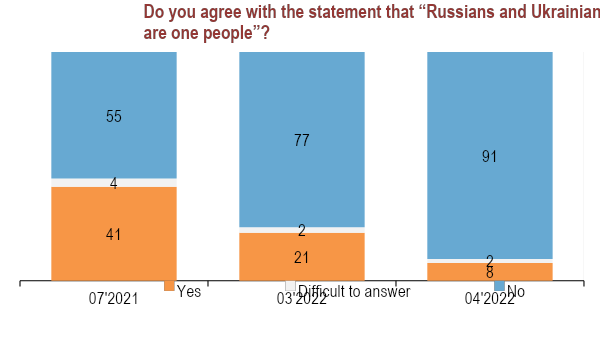
![]()
- Over the last month, the share of the respondents who believe that restoring friendly relations between Ukrainians and Russians is impossible has increased 1.5 times (from 42% to 64%). 22% of the respondent believe that this might happen no sooner than in 20 to 30 years. About 10% predict such reconciliation in up to 15 years. Even in the southern and eastern regions of Ukraine, more than half of the respondents do not believe in restoring the friendship between the two nations.
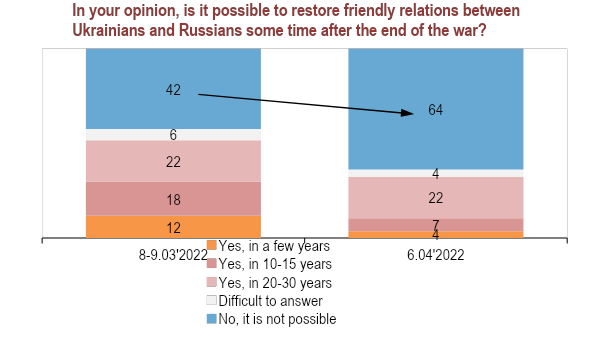
- About 80% of respondents are involved in defending their country in one way or another. 45% of the respondents help protect the country by financial contributions (in March 2022, this share was 39%). 35% volunteer: they help other people or the military. 18% participate in information resistance, 13% work in critical infrastructure, 3% serve in territorial defense, and 3% serve in the military. A quarter of the respondents are unable to help defend Ukraine.
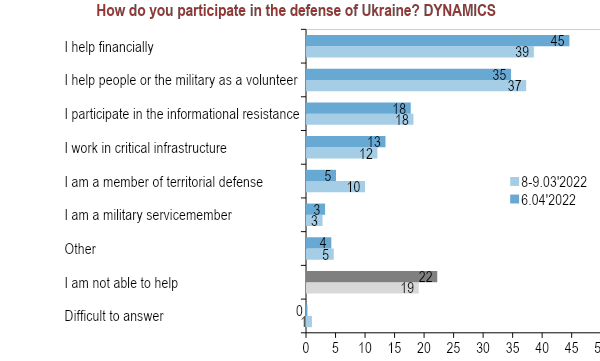
- More and more people are resuming their jobs. Currently, 58% of those who had jobs before the war continue to work (this share was 46% in March). In general, 29% work normally, 26% work part-time or remotely, and 3% started a new job. 41% lost their jobs during the war (53% did in March). Most of those currently employed are in the western oblasts, while only a third of the residents of the East of Ukraine have a job: the other two-thirds have lost their jobs.
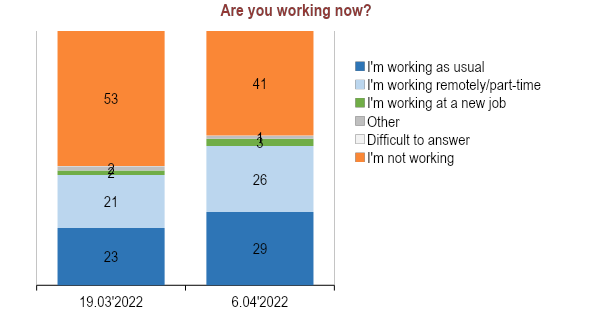
- 20% of the adult population of Ukraine had to change their place of residence. Most of those who were forced to leave their place of residence were from the eastern regions (46%). Also, young people moved out more (31%), while older people found it harder to leave their homes (13%). A third of those who have left their homes plan to return soon, while a quarter will wait a little longer. About 40% are ready to return, but only after the war is over.
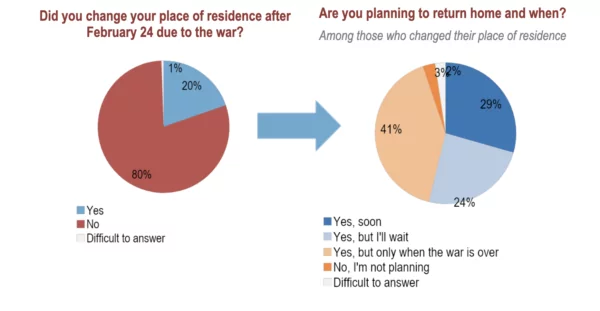
- Almost 80% of the respondents are satisfied with the work of their mayor, the providers of utility services, and the police. Three-quarters are satisfied with the work of medical institutions, while two-thirds are satisfied with public transport and educational institutions.
- The vast majority of the respondents (90%) support the initiative to deprive the pro-Russian Members of Parliament of their mandates. 86% support a total ban on the activities of these MPs in Ukraine.
- 81% support the idea of raising taxes for Ukrainian businesses that continue to operate in Russia.
- 76% support the initiative to rename the streets and other objects, the names of which are linked to Russia.
- The support for the idea that the Ukrainian Orthodox Church of Moscow Patriarchate should sever its ties with the Russian Orthodox Church is growing. 74% support this initiative (63% did in early March). Only 7% do not support it.
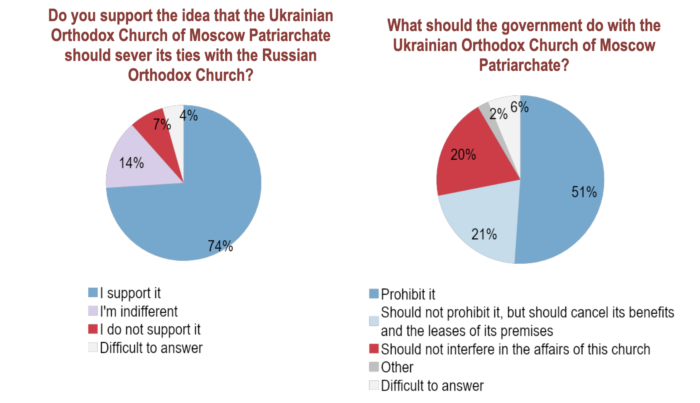
- Half of the respondents (51%) believe that the Ukrainian government should ban the activities of the Ukrainian Orthodox Church of Moscow Patriarchate in Ukraine (the ban is supported by two-thirds of respondents in the West and only by 29% in the East).
Leaders of Moscow Patriarchate in Ukraine shifting allegiance to Kyiv
- At the same time, 21% support the cancellation of the benefits of this church and the abolition of the leases of this church’s premises. Nevertheless, 20% think the government should not interfere in the affairs of the Ukrainian Orthodox Church of Moscow Patriarchate: most of all in the East (35%) and the South (25%).
Read more:
- Moscow Patriarchate tells Russian troops: “Your task is to wipe the Ukrainian nation off the face of the earth”
- Leaders of Moscow Patriarchate in Ukraine shifting allegiance to Kyiv
- Russian court orders demolition of Ukrainian Orthodox Church (Kyiv Patriarchate) in Moscow (2016)
- Support for Ukrainian as sole state language jumps amid Russia’s war – poll
- 93% of Ukrainian refugees plan to return to their hometown after the war – poll
- More Ukrainians support military alliance with UK & Poland than NATO accession, poll shows
- 71% of Russians feel “pride, joy, respect, hope” regarding war against Ukraine – poll
- Over 80% of Ukrainians want to return occupied Crimea and Donbas; 72% in support for joining NATO – poll
- Ukrainians overwhelmingly support their army and Zelenskyy, expect to defeat Russia, but want more help from West, five new polls show

